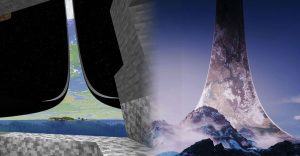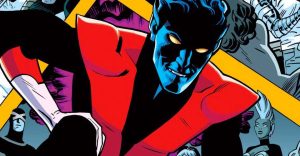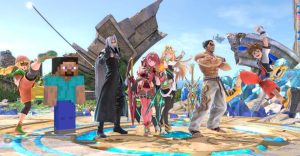Shonen Jump Isn’t Giving its Best New Titles a Chance

The manga publisher Shonen Jump just axed The Hunters Guild: Red Hood with Neru: Way of the Martial Artist not far from the chopping block. These two titles are just the latest casualties in a long line of serialized manga that Shonen Jump quickly cut the cord on before they had a chance to fully develop.
A contributing factor of cancelations undoubtedly has something to do with popularity. As reported by CBR, readers are encouraged to fill out a survey card at the end of every issue, and although the results are never publicized, it’s obvious that these surveys play some sort of role in what inevitably gets dropped or kept. Some series definitely don’t deserve to stay in rotation like Neru, but many others including Red Hood are so promising that when they prematurely end, readers are left befuddled.
The Hunters Guild: Red Hood

The cancelation of The Hunters Guild by Yuki Kawaguchi was unexpected because of how effectively the series knocked down preconceived notions of what constitutes a fantasy shonen. The allure wasn’t the obvious hook, which was the correlation to the Brothers Grimm along with the incorporation of werewolves and the promise of a whole host of fairy tale monsters. What captured readers’ attention was that the protagonist, Velou, was essentially a normal kid with no powers who was guided by instinct. Velou’s lack of powers further compelled readers to root for him, hoping that he would prove himself despite not being special as most shonen heroes usually are.
Even more compelling was that readers expected Velou’s lack of powers would contrast with other characters, putting him at more of a disadvantage – and yet, it turned out that wasn’t the case. Many of Velou’s comrades used intelligence in lieu of powers while those who were gifted in the supernatural were either rare or took advantage of hexes placed on them by repurposing their curses into a blessing. So even though pitting Velou against superpowered beings would have made him more of an underdog, this twist just differentiated The Hunters Guild from the vast majority of series out there. Interestingly, mangaka Yuki Kawaguchi still masterfully created the impression that Velou was at a disadvantage because his comrades’ aforementioned innovations still ended up creating the same effect as what them being superpowered heroes would have done. All of this isn’t even taking into consideration the ultimate twist near the end that essentially introduced a Death Note that could control the events of the world.
Candy Flurry

An earlier casualty that yielded the introduction of the musical fantasy PPPPPP by Mapollo 3 was the series Candy Flurry by artist Mitarashi Santa and writer Takegushi Ippon, which told the story of people who could conjure sugary treats out of thin air and wield them as weapons. Ironically, Candy Flurry suffered mostly from the pressure that Shonen Jump places on mangaka. Ever since the manga publisher began axing series within a matter of weeks, creators were forced to expedite their stories to garner reader interest rather than taking the time to flesh out their characters before unleashing them into their world. Complying with Shonen Jump’s detrimental strategy ultimately hurt Candy Flurry.
The following happens within the short span of 19 chapters: Candy Flurry‘s protagonist Tsumugi Minase attempts to withhold her innermost secret that she can conjure the same treat as the unidentified lollipop user who destroyed Tokyo, her identity is discovered by a member of a police force that hunts down sweet users, she befriends that officer once she proves her ideals, she attempts to join the police with the help of her new friend, she is discovered by the most powerful sweet user officer, and then she fights against a group of rogue sweet users who were part of the initial experiment that created their kind and whose leader is, of course, the infamous lollipop user.
Ironically, Candy Flurry could have been successful if artist Mitarashi Santa and writer Takegushi Ippon didn’t succumb to pressure from Shonen Jump to speed up events. The series’ only self-inflicted downfall was when Tsumugi Minase learned that she could create a Gundam out of her lollipop. The incident and ensuing battle was beyond absurd, but the concept behind her newfound power was not only on-point but serves as the quintessential example of how a shonen manga can successfully take the next step when expanding their series’ battle system, which most action-based shonen leverage to the fullest extent. Tsumugi Minase’s explanation was that lollipops can essentially be anything so long as the treat is on a stick. And she’s right. It was an ingeniously simple concept that writer Takegushi Ippon, unfortunately, didn’t execute correctly.
Neru: Way of the Martial Artist

Unlike the above series, what undoubtedly led to the upcoming cancelation of the manga Neru by Minya Hiraga had everything to do with a lack of creativity. The irony is that Neru started with such promise by introducing a captivating formula. It combined the concept of a lone martial artist living alone in a world that doesn’t support or even recognize the discipline as a tradition to study, with an eerie suspenseful atmosphere, suggesting there’s something more out there. But then there’s a shift that reveals that this something out there isn’t that great as originally implied.
What’s worse, this shift completely abandons what readers found so compelling in the first chapter to adopt a tired trope that also combined elements popularized in Naruto: A gifted outsider gets introduced to a dojo of the best of the best and must overcome overly creative tests to gain entry that are more than what they appear. It’s possible that Neru would have lasted longer if there weren’t such a captivating debut chapter. The first installment successfully created a compelling mystery that left readers wanting more, but when the manga unveiled the truth behind what that mystery actually was, it was a major letdown, undoubtedly culminating in a vast majority of readers instantly dropping the series.
Why weren’t these manga series canceled instead?

What’s ironic is that many of the ongoing series in Shonen Jump shouldn’t have gotten as far as they have, namely Mashle: Magic and Muscle by Hajime Komoto. The concept of the series is downright hilarious and should be a recipe for success. It basically turns Saitama from One Punch Man into Harry Potter except he doesn’t have any magical abilities and needs to prove that he can not only succeed in a school of magic without any powers but become the top student with just his strength. The almost perfect replication of Saitama’s unenthusiastic personality, alone, is a draw, but what obviously pulls in readers is the aforementioned incorporation of elements from Harry Potter. The comparisons are so on the nose that it’s a surprise Shonen Jump doesn’t get sued.
While this sounds like praise, the formula quickly loses appeal and just repeats itself again and again. The eponymous hero Mash always confronts some aspect of the Harry Potter world with a twist and then not only overcomes these obstacles with relative ease, but absolutely crushes the competition, making a complete mockery of the magical abilities of those who opposed him. The first few chapters definitely serve as a successful recipe, but once it’s repeated for the umpteenth time, it’s difficult to stay engaged. The series is undoubtedly just running on the fumes from Harry Potter, and it’s unfortunate that this remains in the roster while others such as The Hunters Guild didn’t make the cut.
Regardless, it’s unlikely that Shonen Jump will deviate from its current business plan of canceling any underperforming title in as little as a few weeks, of which the publisher’s most recent cancelations of The Hunters Guild: Red Hood, Neru: Way of the Martial Artist and Candy Flurry are testament. It’s ironic that this is the current strategy as notable titles like Dragon Ball started out especially slowly. Had Shonen Jump followed the same principles then as it does now then Dragon Ball would have been dropped, robbing the world of one of manga’s most well-known and celebrated stories. Hopefully, the upcoming three manga titles getting serialized in Shonen Jump this month will be as captivating.
About The Author

















